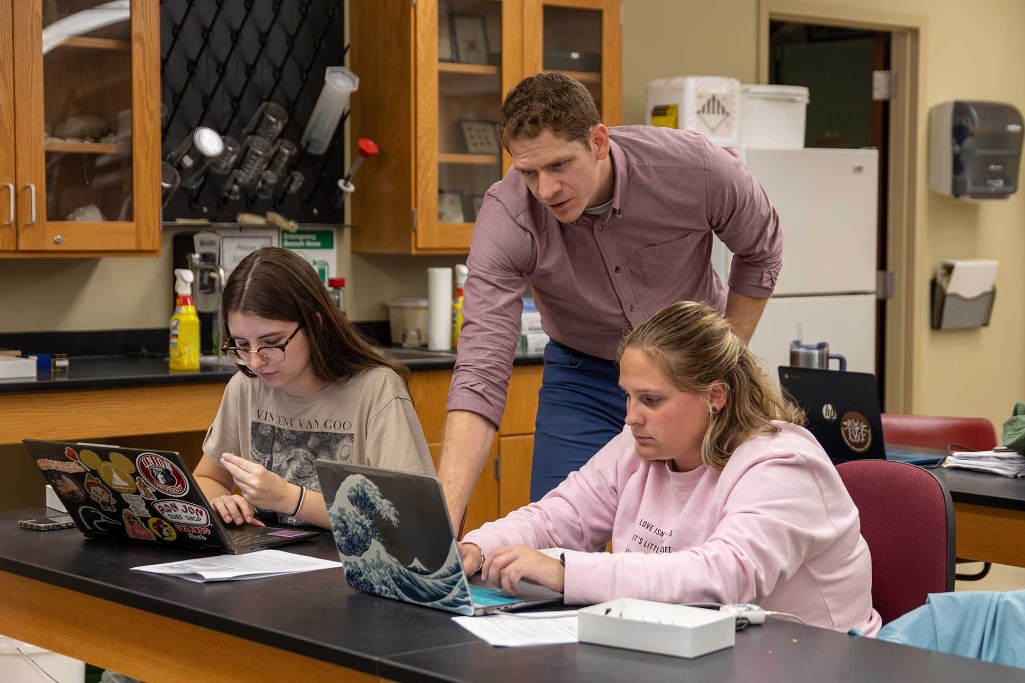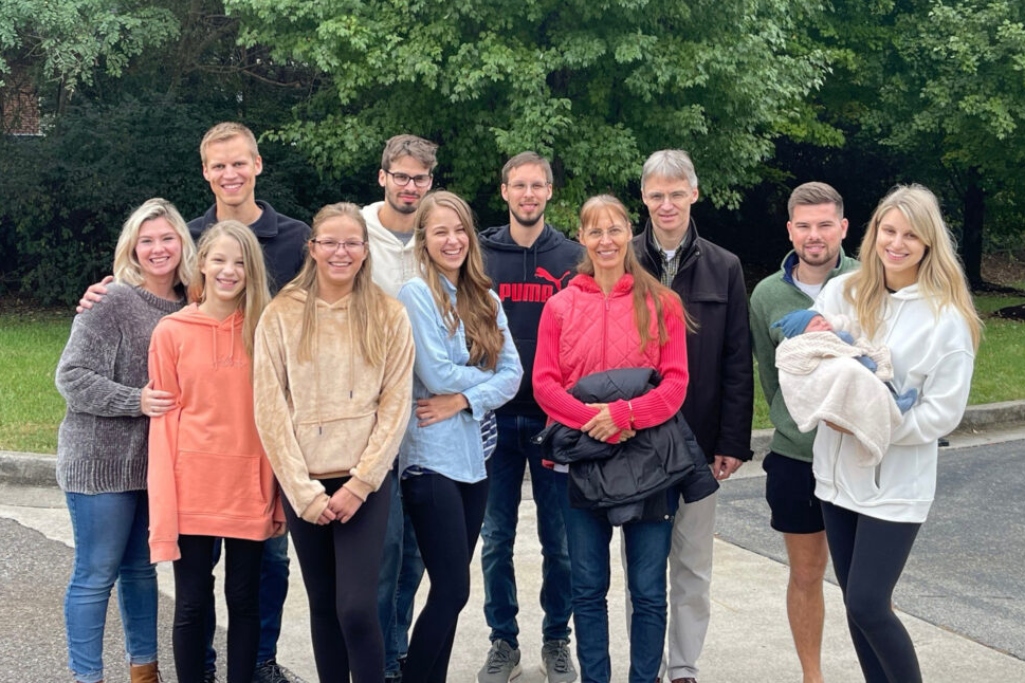
Associate Professor Jeremy Blaschke engages students in a biology class at Union University.
NASHVILLE (BP) — Growing up in New Mexico, Jeremy Blaschke had never even heard of the Scopes Monkey Trial that took place in Dayton, Tennessee, in July 1925.
But as a home schooled teenager and evangelical Christian, he loved science and knew he wanted to study animals to know God better. Blaschke, now an associate professor of biology at Union University, was drawn to Bryan College in Dayton because of its Center for Origins Research, a place where students could deliberately ask questions about humanity’s origins “and why animals are the way that animals are,” he said. “And that’s just exactly what I wanted.
“I think the reason I was at Bryan is kind of a result of the legacy of the Scopes Trial,” Blaschke said. “So even though I didn’t really know about it, it influenced people for the next several generations.”
This week marks the 100th anniversary of the Scopes Trial, a landmark court case that pitted what was then the illegal teaching of evolution in schools against a culture heavily influenced by evangelical Christianity. The media frenzy surrounding the trial pitted science against religion and provided critics of Christianity with ammunition to attack core Christian beliefs — an assault that has persisted for decades and portrayed conservative Christians as ignorant and antiscience.
“The Scopes Trial is kind of like McCarthy and the Red Scare in the sense that it has become a set piece of American history that progressives used to tarnish conservatives and Christians,” said Hunter Baker, provost at North Greenville University. “That basically, these are instances in which progressives perceive themselves to have been acting heroically, and they love to replay the story over and over again.”
In many ways, the Scopes Trial had a much greater impact on the culture than it did on any debate in the scientific community, according to Marcus Ross, a paleontologist and fellow of the Center for Creation Studies at Liberty University. Ross said while the trial was originally “a little local kerfuffle,” it was engineered to be a cultural flashpoint and a publicity stunt by local business leaders to draw more attention to Dayton. The guilty verdict against John Scopes was largely a foregone conclusion.
But the goal of the American Civil Liberties Union, Ross said, was to challenge Tennessee’s Butler Act culturally.
“What it did was set the stage for how many people in the United States would look at the issue of creation and evolution,” Ross said.
The national media attention and the framing of the trial as a battle between fundamentalism and modernism cast opponents of evolution, including prosecuting attorney William Jennings Bryan, “as kind of ignorant rubes, which was not the case,” he added.
Baker emphasized that while Bryan’s reputation suffered as a result of the trial — thanks in large part to the play and subsequent movie “Inherit the Wind” that took great license with the historical facts — he was in fact a major political figure for years as a Democratic presidential candidate and as Woodrow Wilson’s secretary of state. Bryan was concerned that evolution and the ideas behind it would have negative consequences for how people thought about race and the dignity of human beings.
“And really, his concerns were completely validated, I think, by the Nazis’ doctrines,” Baker said.
To Blaschke, one of the legacies of the Scopes Trial is the preservation of a fundamentalist identity in which Christianity is tethered to the inerrancy of Scripture. Christians trust the reliability of Scripture on the virgin birth, the Resurrection of Christ and the creation of Adam and Eve, and all those are “kind of tied together as a package” that became central to fundamentalist Christianity for the next several decades, he said.
Another legacy for Christians is the importance of education. Bryan College, for example, was established in Bryan’s honor and to fulfill his wish that a school in Dayton would teach biblical truth. A well-educated person, Bryan wanted to see a cutting-edge academic institution that could defend the integrity and inerrancy of Scripture from an academic perspective.
“Education is important,” Blaschke said. “We can’t just stagnate in our beliefs. We actually need to study Scripture, we need to study nature, and we need to study those together.”
A century later, one result of that educational emphasis is that although evolutionary theory is still the entrenched dogma in the scientific community, the number of scientists who disagree with that theory has grown in recent years.
“Speaking as a paleontologist and going to geology meetings, anti-evolution or nonevolutionary views are not viewed with great respect in the scientific community,” Ross said. “There are, however, far more scientists that disagree with evolution, either taking a younger creation approach, older creation approach or some sort of intelligent design perspective. There are far more scientists who find themselves in those camps today than there were 20 years ago, 40 years ago and 60 years ago.
“So, while the broader scientific community has not been very much swayed, it has been a little bit,” Ross continued. “And I think that young earth creationism in particular has actually done a very good job of incubating its future talent.”
Blaschke agreed with that perspective, pointing out that there are more “young earth” universities than a century ago — meaning more professors are teaching biology and theology from that perspective and producing students who complete their own advanced degrees while continuing to hold biblical convictions about creation.
“In 2025, there are many Ph.D., highly qualified scientists who affirm a recent creation,” Blaschke said. “In that respect, I think one of the legacies is, yes, there is an increased number of scientists who affirm. On the other hand, I think the cracks that we see in evolutionary theory are the cracks we’ve always seen.”
Those creation scientists are doing good, model-building science, Blaschke said, which in turn trickles down to apologetics ministries like Answers in Genesis.
“And then that trickles to people, families and home schooled students in New Mexico who then go on to join that tradition,” he said.
(EDITOR’S NOTE — Tim Ellsworth is associate vice president for university communications at Union University in Jackson, Tennessee.)


